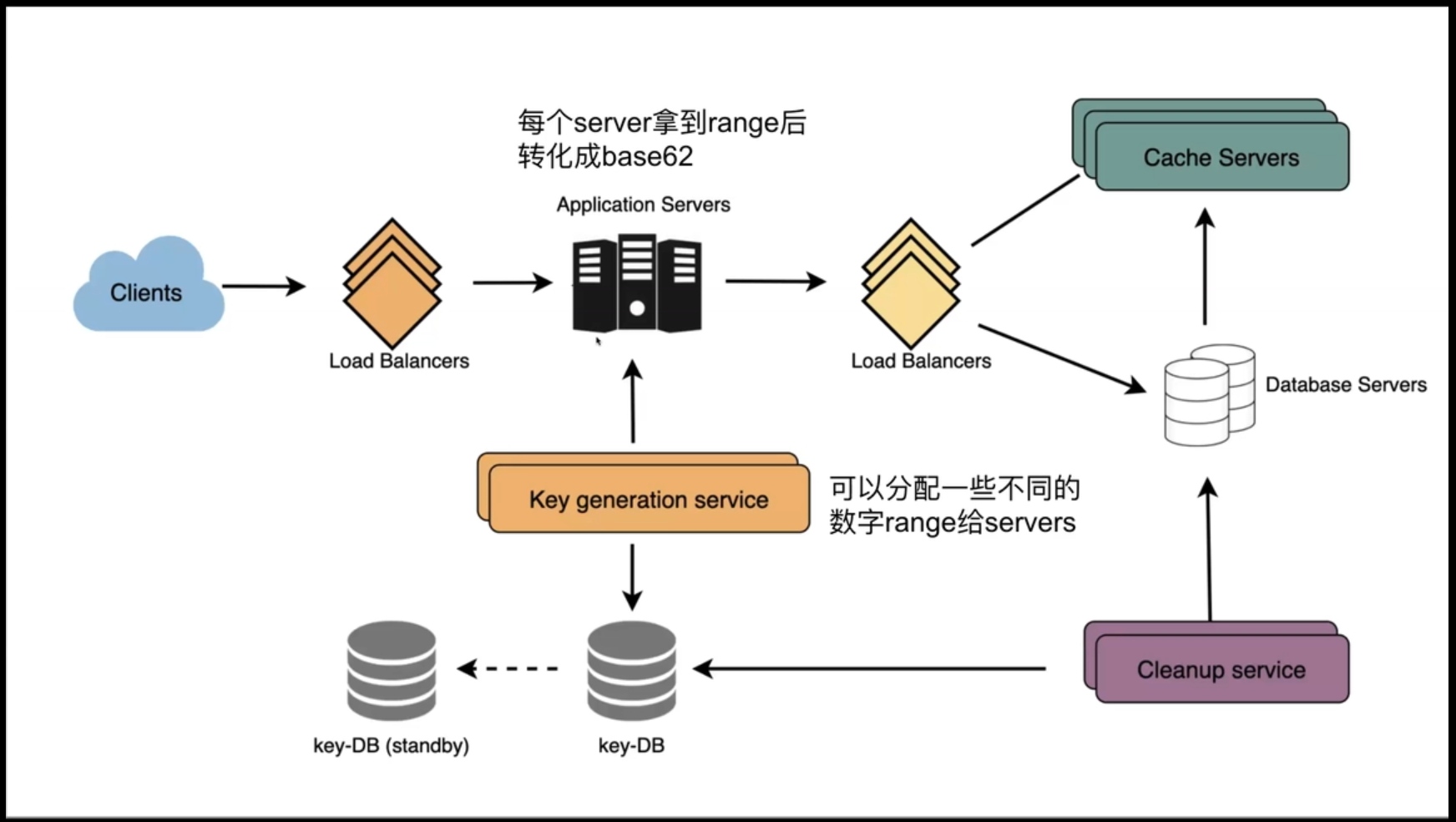 Design Tiny URL System
(Using TinyURL-System to explain System-Design process.)
Design Tiny URL System
(Using TinyURL-System to explain System-Design process.)
Requirement clarification(2min)
functional requirement
- user1: long url ->(response) short url
- user1: share short url to others(user2)
- user2: short ulr ->(http 301 redirect to) long url
- user can set short url TTL(Time To Live)
non-functional requirement
- system should be highly available
- URL redirection should happen in real-time
- short links should not be predictable
extend requirement
- Analytics; e.g., how may time a redirection happened?
- may use http 302 to collect parameters,like: who/when/by whom cliked the short URL
- be accessible through REST/RPC APIs by other services
Scale of the system - data size(5min)
Traffic estimates
- generate 500M/month
-
read/write ratio 100:1
write QPS = 500M/(30(d) * 24(h) * 3600(s)) = 200 URLs/sread QPS = 200 * 100 = 20 K/s
Storage estimates
- save data for 5 years
- 500 byte/url
storage = 30 billion * 500 bytes = 15 TB
Bandwidth estimates
incoming bandwidth = 200 * 0.5KB = 100KB/soutgoing bandwidth = 100 * 100KB/s = 10MB/s
Memory cache estimates
- cache 20% top frequent url per day
total count per day = 20K * 3600 seconds * 24 hours = 1.7 billioncache size = 0.2 * 1.7 billion * 0.5KB = 170GB- use LRU evict policy
API interface(1min)
1 | |
Database data-model(5min)
-
URL
- Hash:varchar(16), PK(PrimaryKey)
- OriginalURL: varchar(512)
- CreationDate: datetime
- ExpirationDate: datetime
- UserID: int
-
User
- UserID: int, PK
- Name: varchar(20)
- Email: varchar(32)
- CreationDate: datetime
- LastLogin: datetime
- we don’t need much relation between object, so we choose nosql like MongoDB
- nosql also can scale up easily、high throughput
High-level design(3min)
- use “base 62” to present a shortURL
- base 64 include “+ -“
- if hash conflict happend, append string harsh again
- Generate algorithm: UUID、distributed uinque id + hash
Detail design(5min)
-
how much characters we need for shorURL? total count is “30 billion” as mentioned before. base 62, so
character count = log(30 billion)/log(62) = 6。 we use 7 characters to avoid Brute-Force attack. -
Encoding actual URL
- hash
- choose one hash function to generate unique id, like MD5, SHA-1, HAVAL, CRC32.
- choose pre 6 characters.
- if conflict, append “userID/timestamp/logID” and rehash.
- use bloom filter to check existence.
- base62 conversion
- use “unique id generator” get a number < 30 billion.
- recursively divide 62 and get base62 character by remainder.
- no need to consider collision for unique id.
- hash
| string hash | base 62 |
|---|---|
| length fixed | lengh may shorter |
| not need unique id generator | need unique id generator |
| collision、rehash | no collision |
| unpredictable | predictable if incr 1, security issure |
Bottlenecks(follow up, 5min)
- how to solve “base 62 predictable” problem ? use a inner mapping table to avoid.
- how to limit client operation ? set a rate count in client session/cookie. ban if reached some degree.
- how to realize URL redirection ? config apache/nginx redirect function.
- purging or DB cleanup
- lazy cleanup, like redis
- clean service run once every day
- default expire date like 2 years. or do not delete “space is cheap”
- reuse deleted short url, put into pool(rebuild bloom filter)
- telemetry, data collection use redirect 302(temporal redirect) to collect more information, like: country of the visitor, date and time of access, web page that referred the click, brower or platform where the page was accessed.
- 1-1 or 1-n (longURL-shortURL)
- 1-1 hash(longURL) generate one shortURL. save storage, but cannot distinguish different user/time/location.
- 1-n(recommended) every time a user generate a different shortURL, save more information at the same time, like: userID, time, location… so that we can do data mining or sell the information. “space is cheap”.
- if one server down and loose 1000 id… just abandon the ids
- Cache space 20% per day, LRU
- Data Partitioning and Replication user different db instance according to cap of the shortURL, to scale out DB. Range-Based Partitioning / Hash-Based Partitioning.